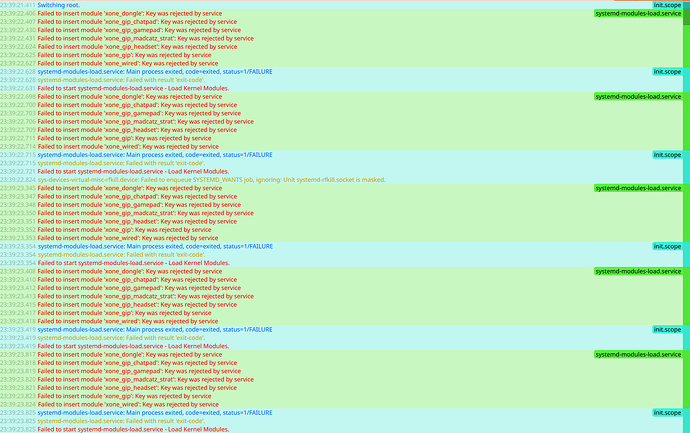I am running Fedora 43. Alot of processes are getting blocked by SELinux and I have no clue what is going on, I have never tampered or had problems with it before.
I have no clue what most of these applications are and why they are getting denied. It’s even warning me for one of them that it is trying to load a kernel module.
These could possibly be related to me installing a FCC Unlock fix and TLP for my laptop. No clue though.
I am also trying to connect my Xbox controller using the XOne kernel module, specifically this Copr.
I did all the steps it said, I even tried to self sign it using openssl and enroll it using the MOK key manager on reboot. Yet still it will not work.
I’ve been practically pulling my hair out because of this, so I would really appreciate if someone helped me with this.
System:
Host: pcbcat-laptop Kernel: 6.17.0-0.rc6.49.fc43.x86_64 arch: x86_64
bits: 64
Desktop: KDE Plasma v: 6.4.4 Distro: Fedora Linux 43 (KDE Plasma Desktop
Edition Prerelease)
Machine:
Type: Laptop System: LENOVO product: 21RVCTO1WW v: ThinkPad P14s Gen 6 AMD
serial: <superuser required>
Mobo: LENOVO model: 21RVCTO1WW v: SDK0T76574 WIN
serial: <superuser required> UEFI: LENOVO v: R2XET33W (1.13 )
date: 06/03/2025
Battery:
ID-1: BAT0 charge: 57.4 Wh (99.8%) condition: 57.5/57 Wh (100.9%)
CPU:
Info: 12-core model: AMD Ryzen AI 9 HX PRO 370 w/ Radeon 890M bits: 64
type: MT MCP cache: L2: 12 MiB
Speed (MHz): avg: 605 min/max: 605/5158:3289 cores: 1: 605 2: 605 3: 605
4: 605 5: 605 6: 605 7: 605 8: 605 9: 605 10: 605 11: 605 12: 605 13: 605
14: 605 15: 605 16: 605 17: 605 18: 605 19: 605 20: 605 21: 605 22: 605
23: 605 24: 605
Graphics:
Device-1: Advanced Micro Devices [AMD/ATI] Strix [Radeon 880M / 890M]
driver: amdgpu v: kernel
Device-2: Chicony Integrated Camera driver: uvcvideo type: USB
Display: wayland server: Xwayland v: 24.1.8 compositor: kwin_wayland
driver: gpu: amdgpu resolution: 1920x1200~60Hz
API: EGL v: 1.5 drivers: kms_swrast,radeonsi,swrast
platforms: gbm,wayland,x11,surfaceless,device
API: OpenGL v: 4.6 compat-v: 4.5 vendor: amd mesa v: 25.2.2 renderer: AMD
Radeon 890M Graphics (radeonsi gfx1150 LLVM 21.1.0 DRM 3.64
6.17.0-0.rc6.49.fc43.x86_64)
API: Vulkan v: 1.4.321 drivers: radv,llvmpipe surfaces: N/A
Info: Tools: api: clinfo, eglinfo, glxinfo, vulkaninfo
de: kscreen-console,kscreen-doctor wl: wayland-info x11: xdriinfo,
xdpyinfo, xprop, xrandr
Audio:
Device-1: Advanced Micro Devices [AMD/ATI] Radeon High Definition Audio
[Rembrandt/Strix] driver: snd_hda_intel
Device-2: Advanced Micro Devices [AMD] Audio Coprocessor
driver: snd_acp_pci
Device-3: Advanced Micro Devices [AMD] Family 17h/19h/1ah HD Audio
driver: snd_hda_intel
API: ALSA v: k6.17.0-0.rc6.49.fc43.x86_64 status: kernel-api
Server-1: PipeWire v: 1.4.8 status: active
Network:
Device-1: MEDIATEK driver: mt7925e
IF: wlp194s0 state: up mac: 66:8d:f9:06:a5:a1
Device-2: Realtek RTL8111/8168/8211/8411 PCI Express Gigabit Ethernet
driver: r8169
IF: enp195s0f0 state: down mac: c8:53:09:fb:67:f9
IF-ID-1: wg0-mullvad state: unknown speed: N/A duplex: N/A mac: N/A
IF-ID-2: wwan0 state: unknown mac: N/A
Bluetooth:
Device-1: MediaTek Wireless_Device driver: btusb type: USB
Report: btmgmt ID: hci0 state: up address: AC:F2:3C:61:53:F6 bt-v: 5.4
Drives:
Local Storage: total: 1.86 TiB used: 117.11 GiB (6.1%)
ID-1: /dev/nvme0n1 vendor: SK Hynix model: HFS002TEJ9X162N size: 1.86 TiB
Partition:
ID-1: / size: 1.86 TiB used: 116.53 GiB (6.1%) fs: btrfs dev: /dev/dm-0
ID-2: /boot size: 973.4 MiB used: 572.2 MiB (58.8%) fs: ext4
dev: /dev/nvme0n1p2
ID-3: /boot/efi size: 598.8 MiB used: 19.3 MiB (3.2%) fs: vfat
dev: /dev/nvme0n1p1
ID-4: /home size: 1.86 TiB used: 116.53 GiB (6.1%) fs: btrfs
dev: /dev/dm-0
Swap:
ID-1: swap-1 type: zram size: 8 GiB used: 0 KiB (0.0%) dev: /dev/zram0
Sensors:
System Temperatures: cpu: 45.0 C mobo: N/A
Fan Speeds (rpm): fan-1: 0 fan-2: 2370
Info:
Memory: total: 88 GiB available: 86.05 GiB used: 5.36 GiB (6.2%)
Processes: 567 Uptime: 12m Shell: Bash inxi: 3.3.39


